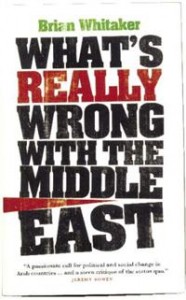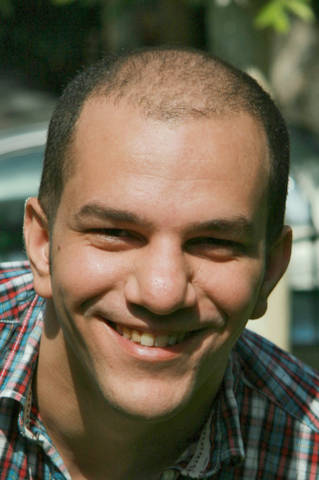Diagnosing the Middle East’s ills
Author and journalist Brian Whitaker diagnoses the Arab world's problems in his latest book.
18 January 2010

When debate opens up on the problems in the Middle East, finger pointing is the first weapon in the argument. Whether it is Middle Easterners blaming contemporary problems on centuries of Western interference or the West focusing on authoritarian regimes and militant religion, the source of problems in the region can always be found in one place: somebody else's lap.
Brian Whitaker sums this up succinctly in the first sentence of his book What's really wrong with the Middle East: “The problems of the Middle East are always someone else's fault.”
Whitaker should know: he spent seven years as the Middle East editor at British daily The Guardian and holds a degree in Arabic from the University of Westminster. Whitaker utilises his depth of experience in the region to diagnose the problems that plague it, conducting a series of unstructured interviews with a kaleidoscope of people to pinpoint what he believes to be the Middle East's key problems. But don't expect the book to be an author's sermon on the ills of the region. What's really wrong with the Middle East cedes the pulpit to Whitaker's interviewees.
“I deliberately chose not to interview politicians or any of the talking heads favoured by visiting journalists,” Whitaker tells Egypt Today, adding that the people he talked to were not selected according to any agenda. “They were mostly people I had come across in the course of my work who seemed to have interesting things to say. I tried to let them shape the interviews as much as possible. I didn't have a fixed set of questions or anything like that. I gave them a list of 10 statements — about politics, oil, the media, corruption, etc. — and asked them to choose those they wanted to talk about.”
Whitaker divides the book into nine chapters, each tackling one topic that, in his opinion, hinders reform. For example, the first chapter explains how education in the Middle East is designed to discourage free and critical thinking. Instead, it encourages “thinking inside the box” and is used by regimes to maintain power. The book moves on to explain how power is inherited and is usually driven from the father's power. In chapter three, there is a discussion of the distance between Arab governments and their citizens, as well as the often-negative perception the public has of governments.
Although Whitaker emphasises that regime change will not immediately solve the problems of Arab countries, he spares no criticism of the region's governments. He sees power in the region as an almost genetic inheritance that engenders all manners of nepotism, bribery and administrative corruption.
However, in Whitaker's mind, Arab countries are more than simply repressive political regimes. Deep faults in civil society, he posits, are doing just as much damage to the region as the regimes that manage it.
“What I'm saying in the book is that the problem is a lot more complex and you have to look at Arab society as a whole, not just the regimes,” he explains. “It does mean there are no quick fixes. I'm sorry about that, but to pretend otherwise would just be deceiving ourselves.”
Whitaker similarly takes to task the censorship of the press and the internet, the lack of political expression in Arab countries, discrimination, resistance to globalization and the lack of openness to other cultures fostered in this climate.
With emphasis on interviews and real-life stories, supplemented with studies and comments from experts, What's really wrong with the Middle East reads more like an in-depth feature article than a textbook survey of the region. “I wanted to give it a different flavour from most books about the Middle East,” says Whitaker, “so I decided to use Arab sources wherever possible — things that Arabs had written or said, but preferably available in English so that Western readers could explore them in more detail if they wanted to.”
The book took Whitaker more than a year and a half to compile and write, due in part to the legwork he felt was necessary. “To stop it from becoming too dry and academic, I wanted to include some face-to-face interviews,” he explains. “I made trips to Egypt, Jordan and Lebanon, as well as to France, Belgium and the Netherlands especially for that.”
Whitaker's objectives in writing the book were two-fold. First, he believed that debate in the West about Arab countries and the problems plaguing them was ill-informed — especially in the United States during the Bush presidency.
“I wanted to give a more complete picture,” Whitaker says, “one that delves beyond the usual issues such as terrorism and dictatorship into areas that are less often talked about: authoritarianism within the family, corruption, social discrimination, the pressure to conform and not think outside the box.”
His other objective was to confront the culture of denial in Arab countries. “If the problems are acknowledged at all, they are usually blamed on outsiders,” he says. “Western countries certainly bear some responsibility, but that's no excuse for Arabs to sit back and do nothing. At some point they'll have to say: ‘OK, we're in a mess. How are we going to get out of it?'”
In the book, Whitaker points to how the invasion of Iraq highlights the West's belief that overthrowing tyrants is a silver bullet to address the region's woes. He finds that ousting authoritarian regimes is not a panacea for the region as a whole. The book implies that authoritarianism exists in schools, colleges, families and the workplace, and overthrowing regimes will not and cannot instantly change that. The thread Whitaker weaves throughout the book is that political change and democracy cannot happen unless preceded by social change.
While the title implies that someone — maybe Whitaker — holds all the answers, the author's real conclusion is that there are no quick fixes for the region's ills.
Despite his challenging observations, Whitaker believes strongly that progress is being made: “Arab society is definitely changing, if only slowly at the moment. But the more it changes, the more it is likely to change. And I think the forces driving that change — globalization, satellite TV, the internet, foreign travel and so on — are virtually unstoppable in the long term, even if there are setbacks along the way.”
This review first appeared in the January 2010 edition of Egypt Today. Republished here with the author's consent. ©Osama Diab. All rights reserved.


